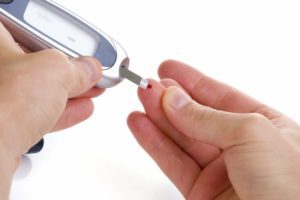Lower your blood sugar with Vitamin D?
The normal blood vitamin D level is between 20 ng/mL to 50 ng/mL. In this study people with low vitamin D levels were randomly assigned into 2 groups to take either 50,000-IU vitamin D supplements (n = 30) or placebo (n = 30) every 2 weeks for 6 months. The results showed a decrease in fasting glucose, a decrease in insulin and decreased levels of markers of inflammation such as C-reactive.
Therefore, if you have type 2 diabetes or coronary artery disease consider getting your vitamin D levels checked and supplementing as appropriate.

The Research:
J Nutr. 2017 Mar;147(3):384-389. doi: 10.3945/jn.116.242008. Epub 2017 Jan 25.
Long-Term Vitamin D Supplementation Affects Metabolic Status in Vitamin D-Deficient Type 2 Diabetic Patients with Coronary Artery Disease.
Farrokhian A1, Raygan F1, Bahmani F2, Talari HR3, Esfandiari R3, Esmaillzadeh A4,5,6, Asemi Z7.
1 Department of Cardiology, School of Medicine.
2 Research Center for Biochemistry and Nutrition in Metabolic Diseases, and.
3 Department of Radiology, Kashan University of Medical Sciences, Kashan, Iran.
4 Obesity and Eating Habits Research Center, Endocrinology and Metabolism Molecular-Cellular Sciences Institute.
5 Department of Community Nutrition, School of Nutritional Sciences and Dietetics, Tehran University of Medical Sciences, Tehran, Iran; and.
6 Department of Community Nutrition, School of Nutrition and Food Science, Isfahan University of Medical Sciences, Isfahan, Iran.
7 Research Center for Biochemistry and Nutrition in Metabolic Diseases, and asemi_r@yahoo.com.
Abstract
Background: Vitamin D might be beneficial in diabetic patients with coronary artery disease (CAD) through its favorable effects on metabolic profiles and biomarkers of inflammation and oxidative stress.Objective: This study was performed to examine the effects of 6 mo of vitamin D supplementation on metabolic status in diabetic patients with CAD.Methods: This randomized, double-blind, placebo-controlled clinical trial was conducted in 60 vitamin D-deficient diabetic patients with CAD aged 40-85 y. Subjects were randomly assigned into 2 groups to take either 50,000-IU vitamin D supplements (n = 30) or placebo (n = 30) every 2 wk for 6 mo. Fasting blood samples were obtained at the beginning of the study and after the 6-mo intervention to quantify glycemic indicators, lipid concentrations, and biomarkers of inflammation and oxidative stress.Results: Compared with placebo, vitamin D supplementation resulted in significant reductions in fasting plasma glucose (-14.9 ± 7.1 compared with +19.3 ± 7.1 mg/dL; P = 0.001), serum insulin (-2.7 ± 1.1 compared with +1.8 ± 1.1 μIU/mL; P = 0.006), homeostasis model assessment of insulin resistance (-0.7 ± 0.3 compared with +0.5 ± 0.3; P = 0.01), and β cell function (-9.1 ± 4.2 compared with +5.7 ± 4.2; P = 0.01) and a significant increase in serum vitamin D (+6.8 ± 0.9 compared with +0.1 ± 0.9 ng/mL; P < 0.001) and the Quantitative Insulin Sensitivity Check Index (+0.008 ± 0.004 compared with -0.007 ± 0.004; P = 0.01). In addition, changes in serum high-sensitivity C-reactive protein (hs-CRP; -1.0 ± 0.5 compared with +0.6 ± 0.5 μg/mL; P = 0.02), plasma nitric oxide (NO; +7.0 ± 2.0 compared with -4.6 ± 2.0 μmol/L; P < 0.001), total reduced glutathione (GSH; +104 ± 16.4 compared with +24.8 ± 16.4 μmol/L; P = 0.001), and malondialdehyde concentrations (-0.2 ± 0.1 compared with +0.2 ± 0.1 μmol/L; P < 0.001) in the supplemented group were significantly different from the changes in these indicators in the placebo group.Conclusions: Overall, 6 mo of vitamin D supplementation among vitamin D-deficient diabetic patients with CAD had beneficial effects on glycemic control and serum hs-CRP, NO, GSH, and malondialdehyde concentrations. This trial was registered on the Iranian website (www.irct.ir) for registration of clinical trials as IRCT201510315623N56.
© 2017 American Society for Nutrition.











